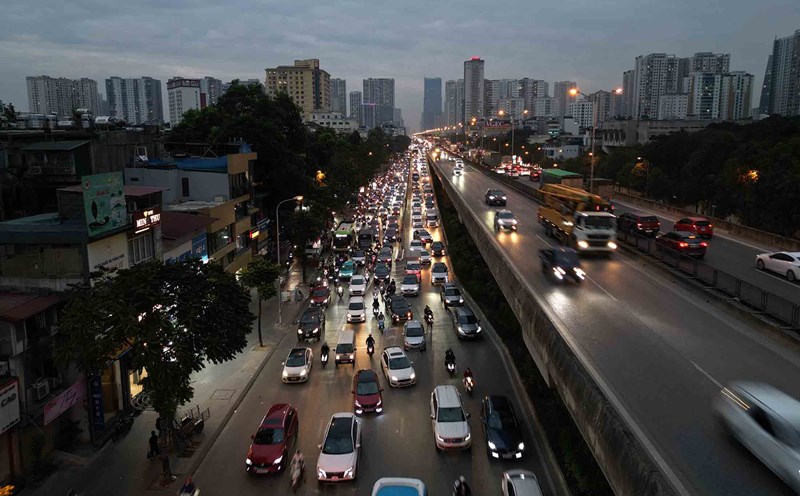Deadline for issuing policies to support people to switch to gasoline vehicles
The Prime Minister issued Directive 20/CT-TTg in 2025 on a number of urgent tasks, resolutely preventing and combating environmental pollution.
In which, it requires the Hanoi People's Committee to implement a number of key solutions with a specific roadmap:
- Develop and announce a project on low emission zones (in the third quarter of 2025) and organize propaganda to raise public awareness in implementing low emission zones.
- Balance and arrange local budgets, strongly mobilize social resources and have a specific roadmap from now until 2030 to focus on developing a multi-modal public transport network, covering all routes, connecting key areas, charging station systems, services for vehicles using clean energy, prioritizing the use of electric buses and electric trains. Implement the Comprehensive Project for investment in the construction of the capital's urban railway system in accordance with the spirit of Resolution No. 188/2025/QH15 dated February 19, 2025 of the National Assembly.
- Issue mechanisms and policies to support businesses in manufacturing and assembling vehicles using clean energy, businesses in developing infrastructure to serve vehicles using clean energy in implementing green transformation; policies to encourage and support people to convert from vehicles using fossil fuels to vehicles using clean energy or using public transport (issued before September 30, 2025).
Detailed roadmap for eliminating gasoline-powered motorbikes in Hanoi's inner city
In addition, the Directive also assigned Hanoi to study the increase of registration fees, registration fees, license plates for motor vehicles, specialized motorbikes, and vehicle parking service prices in the central area for vehicles using fossil fuels (Building a specific roadmap from the third quarter of 2025 and adjusting annually).
Implement solutions and measures to ensure that organizations and individuals who convert vehicles and routes by July 1, 2026 will not have motorbikes or mopeds using fossil fuels circulating in Ring Road 1; from January 1, 2028, there will be no motorbikes or mopeds, and private cars using fossil fuels will be restricted to circulate on Ring Road 1, Ring Road 2; from 2030, continue to expand implementation in Ring Road 3.
Hanoi has proactively prepared in advance
In fact, Hanoi has begun a roadmap to limit and prohibit motorbikes in the inner city when the City People's Council passed Resolution 04 on stopping motorbikes in the old districts by 2030. On December 12, 2024, the resolution on implementing low emission zones continued to be approved, effective from January 1, 2025.
Accordingly, motorbikes and mopeds that do not meet level 2 emission standards will be restricted or banned from circulating in low emission zones according to specific time frames and areas.
Along with that, on July 5, 2025, in Hanoi, the Ministry of Agriculture and Environment held a working group consultation conference to complete the Draft "National Action Plan on overcoming pollution and managing air quality for the period 2025-2030".
According to the Draft Plan, by 2030, 100% of vehicles in Hanoi and Ho Chi Minh City will have their emissions controlled, moving towards using clean fuel. The two urban areas will pilot a policy of financial support, exemption/discount for students when using public buses and bicycles.
From 2026 - 2028, the two cities will pilot policies to support the conversion of old motorbikes to electric vehicles, aiming to expand after 2028. Hanoi is assigned to develop a project to limit new motorbike registration in some central districts and move towards stopping the issuance of vehicle registration using fossil fuels.
Previously, at a working session with the Vietnam Association of Motorcycle Manufacturers (VAMM) on June 9, Chairman of the Hanoi People's Committee Tran Sy Thanh emphasized: "Hanoi will deploy low emission zones in 4 inner-city districts. However, the city will carefully consider the implementation time, it cannot do it without and cannot delay any longer. The first step is with motorbikes and continue to research with cars, not just motorbikes".
The leaders of Hanoi also said that the Government of Japan and the Governments of European countries, the European Union (EU), and developed countries are also actively supporting Hanoi and Ho Chi Minh City in developing public transport, with the core being urban railways. From now until 2035, the city will have to complete about 10 urban railway lines.











